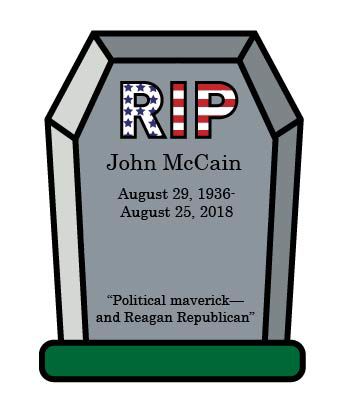OPINION: McCain stood up to Trump, but did not stand up for the marginalized

OPINION: McCain stood up to Trump, but did not stand up for the marginalized
September 4, 2018
In the wake of John McCain’s death from glioblastoma Aug. 25, headlines have defined his legacy: a “maverick,” according to Rolling Stone; a man with “a rare sense of honor,” according to NBC; “courageous,” according to The Washington Post. McCain was a war hero, a survivor of torture and one of few politicians on the right side of the aisle willing to stand up to President Donald Trump. McCain was all this and more, but these headlines and the larger discourse emerging in the wake of his death ignore decisions he made that harmed many Americans.
When a public official dies—whether the official is politically as close to center as McCain or as far right as former Supreme Court Justice Antonin Scalia—Americans are often swept up in honor and fond remembrance. It is considered rude to speak ill of someone recently deceased. But it is better to be rude than to ignore the harm caused by those who have held power over millions and used that power to vote against anything that threatened their privilege.
McCain held a hard anti-abortion stance throughout his political tenure and voted against federal minimum wage increases 19 times. Despite gaining notoriety for speaking out against Trump, McCain voted in favor of Trump’s stances 83 percent of the time. He voted to strip Planned Parenthood of funding, to stop employers from keeping record of worker injuries and illnesses and to repeal the Affordable Care Act, according to congressional voting records. He voted in support of nearly every Trump appointee, the people now implementing policies which harm marginalized groups across the country.
Much of the posthumous praise for McCain has been for the rare occasions when he defied Trump, including when he famously criticized the president for making racist remarks to the parents of a veteran who died in the Iraq war, according to an Aug. 27 Washington Post article.
The moments when McCain called out corruption are the moments he shined, but a legacy is much more than the occasional moments a man stands up for what is right. A legacy is a reminder of the people he stepped on to gain a platform, including women and the working class.
During a time when truth often rests feet below a murky surface and when journalism faces more criticism than ever, the way we assess the world is important. To deny the harmful parts of McCain’s legacy would be to deny the nuances of history and the complexities of the world we live in today. The world has never been black and white, and even the courageous mavericks with a rare sense of honor live much of their lives in the gray.







